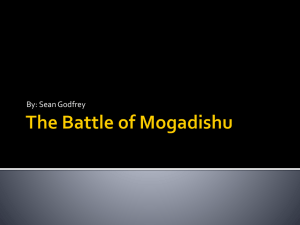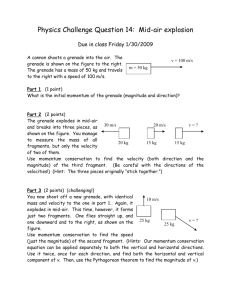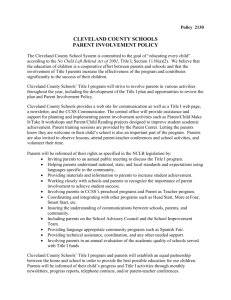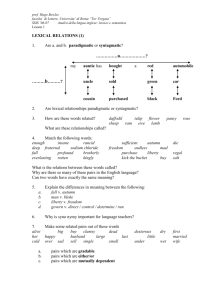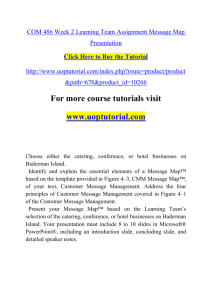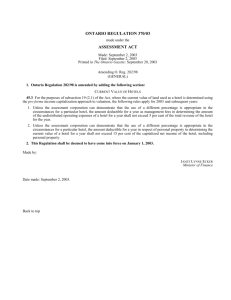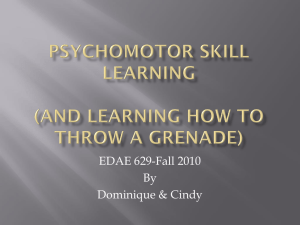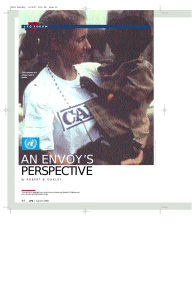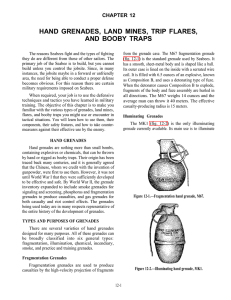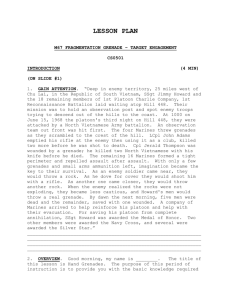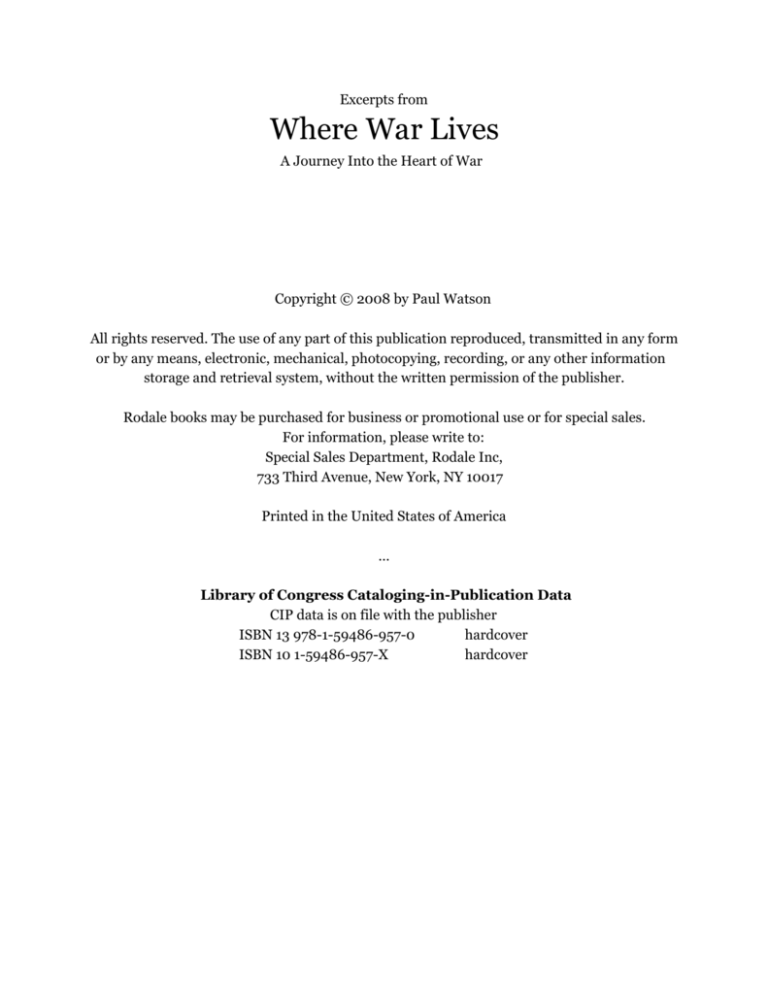
Excerpts from
Where War Lives
A Journey Into the Heart of War
Copyright © 2008 by Paul Watson
All rights reserved. The use of any part of this publication reproduced, transmitted in any form
or by any means, electronic, mechanical, photocopying, recording, or any other information
storage and retrieval system, without the written permission of the publisher.
Rodale books may be purchased for business or promotional use or for special sales.
For information, please write to:
Special Sales Department, Rodale Inc,
733 Third Avenue, New York, NY 10017
Printed in the United States of America
…
Library of Congress Cataloging-in-Publication Data
CIP data is on file with the publisher
ISBN 13 978-1-59486-957-0
hardcover
ISBN 10 1-59486-957-X
hardcover
1
THE BEGINNING OF THE END
“War would end if the dead could return.” – Stanley Baldwin
Little Birds and Black Hawks crisscrossed the sky like dragonflies darting over a pond
at dusk. The helicopters were a few miles away, far enough to be a faint hum against a warm,
salty breeze blowing in from the Indian Ocean. The sky was slowly shifting from indigo to
gold as the sun set. I was on the roof of Mogadishu’s lowrise Sahafi Hotel. Arabic for
journalist, the Sahafi was the retreat where I went each evening to get above it all, to hear the
wind and to toast another day of surviving Somalia’s anarchy. With each tilt of my beer can, I
tried to flush my mind, but the alcohol only shifted the fear a little, sending it slithering down
to the void where it coiled up like a snake, tensed to strike.
It was a Sunday evening: October 3, 1993, and I was on assignment in Somalia for the
Toronto Star. The day’s news seemed far away: in Moscow, Boris Yeltsin was amassing tanks
to capture Parliament. Next to the drama of war on the streets of a nuclear-armed former
superpower, yet another skirmish in the swirling grit of Mogadishu was easily missed by the
world. Murders and kidnapping threats had cleared the city of all but a few reporters, and the
main wire service offices had been evacuated. I didn’t have my own satellite phone, so there
was no worry about being on the foreign editor’s speed-dial. I could file when I felt like it.
And, on this beautiful evening in Mogadishu, after weeks of chasing a story that had dropped
off the map, I felt like getting drunk.
The charcoal black U.S. Army helicopters flying low over the city, banking hard this
way or that, were a pleasant diversion, like a country-fair air show for the tailgaters far below
in the parking lot. The soldiers sitting on the Black Hawks’ door sills, their legs dangling in
mid-air, had tried and failed so many times to arrest fugitive Somali warlord Mohammed
Farah Aideed that a sky buzzing with combat helicopters wasn’t much to get excited over any
longer.
I’d never heard of Operation Gothic Serpent. I had no idea that the code-named raid
for this October day, one that weaken the U.S.for years to come, was unraveling before my
eyes. And I never would have guessed that more than a decade later I’d still be struggling to
escape its vortex.
The afternoon had been as ordinary as one could be in the anarchy of Mogadishu,
capital of a looted country where warring clans ruled the land and blood in the water lured
shivers of man-eating sharks to blinding white beaches. My driver and gunman got me safely
through the ten-minute hurtle from the Sahafi to the Pakistani army checkpoint, and then on
to the heavily fortified U.S. embassy compound for the afternoon briefing. I pushed past the
begging kids, who pawed at me with grimy fingers, calling me by my street name, Gamay, or
“The Man with One Hand,” in Somali. “Give me money! Gamay, give me money!” they
shrieked.
After shaking them off, I entered through the sandbagged gate and into the safe
cocoon of the JIB, or Joint Information Bureau, where military flacks dispensed each day’s
ration of spin, half-truths, and outright lies. They often passed around a plate of candies or
cookies, as if we were hyperactive kids easily soothed with a sugary snack and a good nap.
When that game was over, and I had a little more in my notebook than the day’s troop
number update and numerous assertions that the world was unfolding as it should, I walked
to the Israeli PX, military shorthand for Post Exchange, a makeshift duty-free shop in a circle
of rusty shipping containers on the embassy grounds. True to habit, I bought a twelve-pack of
Amstel and drinking snacks. After almost two years covering Somalia, I needed the better part
of a case of beer just to get through each day, order the disorder into some kind of story, and
put myself to sleep. Around the same time that the Israeli duty-free man was ringing up my
purchases, a U.S. Army Special Forces crew was approaching its target area in a Black Hawk
code-named Super Six-Four.
Not long after 4:30, when my gunman, Mohomud Hersi Ali, had loaded the beer and
groceries into the trunk, my driver wheeled the car around for the race back to the relative
safety of the Sahafi. Less than three miles away, Staff Sergeant William David Cleveland had
his finger on the trigger of a machine gun pointing out the chopper’s side door, near the
Olympic Hotel in Aideed’s Bakara Market stronghold. He was trying to cover the crew of
another Black Hawk brought down by a rocket-propelled grenade (RPG). Below, he could see
swarms of Somali fighters running along a warren of streets and back alleys, sprinting from
behind one tin shack only to disappear behind another. Gray smoke trails snaked up into the
sky around him as the guerrillas tried for another aerial takedown. Attackers fired a barrage
of more than one hundred airburst RPG rounds at the choppers.
Cleveland was a fifteen-year military veteran, the son of a Navy chief petty officer, and
the latest to serve in a family that has had a soldier in every generation since the Civil War.
Now Cleveland was a Night Stalker, a member of the U.S. Army’s 160th Special Operations
Aviation Regiment. They are an elite corps of warriors who live and die by the creed that
theirs “is a calling only a few will answer, for the mission is constantly demanding and hard.
And when the impossible has been accomplished the only reward is another mission that no
one else will try.” Cleveland and the rest of the five-man crew on Super Six-Four had each
sworn a solemn pledge to “guard my unit’s mission with secrecy, for my only true ally is the
night and the elements of surprise.”
And here they were, hovering in the harsh afternoon light, a chopper full of soldiers
sent in to arrest some of Aideed’s top lieutenants. The operation was in the middle of the
warlord’s turf, and hundreds of guerrillas in his Somali National Army faction were fighting
back hard. They’d shot down one Black Hawk, and were taking aim at Super Six-Four as it
flew some seventy-five feet above the street, in a blitz of bullets and rocket-propelled grenades,
trying to save fallen comrades. Cleveland, one of two crew chiefs on board, was manning n
M134, a six-barrel, air-cooled Gatling gun that could spew four thousand bullets per minute.
The chopper’s pilot, Chief Warrant Officer Michael Durant, wouldn’t throw the cockpit switch
to arm Cleveland’s electric weapon until the last minute. He didn’t want any friendly fire
coming from his bird. The troops would fast-rope down to the target, the chopper would pull
out, and Cleveland would be back to base with the rest of Super Six-Four’s crew in a matter of
minutes. He was just weeks away from going on leave to his hometown, Peoria, Arizona, with
a plan he had rehearsed over and over in his mind. He would walk up to the door of his
mom’s trailer home and surprise her for Christmas--and then...
BANG
An RPG exploded near Super Six-Four’s tail rotor, blasting the blades and gearbox, and
sending the Black Hawk into a fatal spin as the pilots fought to keep control.
“We’re going in hard,” Durant radioed.
Just over a mile from the crash site, I was still alone in my rooftop world, oblivious to
the quickening battle, which would inflict the worst combat losses on U.S. troops since
Vietnam. The day’s tension was starting to melt from my shoulders. I felt a warm touch of
nostalgia for the person I was before I came to this place. I remembered how much I used to
love helicopters. When I was a child, watching Hueys sweeping over the jungles of Southeast
Asia on the news, I thought for the first time: War is cool.
To a suburban kid like me, a sponge for sterilized images flickering across the TV
screen, a Huey was just another 1960s mod icon, like Twiggy or the peace sign. Hueys shared
their rounded lines. Front on, their noses were blunt, not hard-edged and sinister-looking by
the thump of rotors and the sheer magic of their hover, as brave men with a rifle in one hand
and the other holding down a helmet jumped into rice paddies swirling in the downdraft.
Hueys often flew low and slow into combat drop zones, daring the enemy to take his best
shot. They came to save lives as much as take them. Huey medevac crews who did the
ambulance runs were airborne white knights.
Somalia made me hate helicopters and the men who looked down from them. I vividly
remember the first time that I saw helicopters as most Somalis did, with a mixture of awe at
the choppers’ power and anger at the military arrogance they came to symbolize. I was in a
weapons collection point where militias store their aging artillery guns and tanks to meet the
U.N.’s demand for disarmament. To make sure militia fighters didn’t suddenly reclaim the
weapons, the U.S. military decided to put them permanently out of commission with hovering
Cobra attack helicopters. The three-barrel 20-mm cannon mounted under a Cobra’s nose is
wired to nimbly swivel wherever the pilot looks. One of the two-man crew wouldn’t take his
eyes off me. He hovered overhead, just to one side, and as I held my arms and notebook
above my head in mock surrender, the Cobra’s nose cannon scanned me up and down,
focusing in on my head, doing a tight circle as it traced the perimeter of my face, like some
nightmare of a giant mosquito sniffing around for the softest spot to stab its proboscis. Every
day after that, I wondered while driving through Mogadishu whether someone was staring
from above through a gun trained on my rented white Toyota Cressida.
~
By the time the Black Hawks powered up their rotors on the afternoon of October 3, it took
only one hand to count the number of foreign journalists left in Mogadishu. One of the
holdouts, an Australian radio reporter, had joined me on the roof of the Sahafi that evening
with a Somali interpreter who worked for another reporter, and a U.M. contract worker. We
were making small talk, a little bored with what looked like another training exercise or
another botched attempt to get Aideed. But then a pulse of adrenalin. I focused on the horizon
to the east. I thought I saw a small flash of fiery yellow light behind a chopper’s tail rotor. It
might have been the setting sun glinting off a car window, and I was almost through the first
beer, so I could just as easily have been seeing things. I did a double take and looked again at
the spot where I thought I’d seen a Black Hawk flying low.
I’m sure of it.
“Did you see that?” I said to the Australian radio reporter.
“What?”
“I thought I saw a flash behind one of those choppers. I think it went behind that hill
over there, but I don’t see it now.”
I took another swig of beer. You had to be careful not to make too much out of things.
Nobody wanted to be the guy who ducked when a car backfired. It meant you were either in
over your head, or burnt out. Maybe I was both.
Within minutes, as dusk fell, a convoy of about twelve U.S. Army trucks and Humvees
with probably one hundred soldiers in them inched through the traffic circle across from the
hotel. The soldiers were in five-ton trucks, facing each other on benches, with their backs
pressed against wooden slats, rifles between their knees. “That’s a pretty stupid way to drive
through Mogadishu,” I thought, and as the lead vehicle moved slowly into the K-4 traffic
circle, heading north from the airport to Aideed’s main stronghold, I saw dozens of Somalis
running down back alleys in front of the hotel, ready to ambush with rifles and grenade
launchers. They blasted the front vehicle, which exploded in flames. The rest of the convoy
opened up on any building they could see, laying down a circle of fire. Their .50-caliber guns
pounded like pneumatic drills. Grenade launchers pumped out 40-mm rounds.
We hit the roof. I pressed myself into the concrete as fiery orange tracer bullets hissed
barely an inch above the three-foot parapet just beside us. A grenade blast blew a rectangular
hole a yard across in the flimsy wall, leaving only sharp-edged hunks of concrete. Jagged
fragments of wall and bits of grenade shrapnel showered down on us. Suddenly I was praying
for intervention from a Heaven I didn’t believe existed.
Please God, don’t let it hit my head.
Another grenade exploded next to where the first hit, and then another, as the grenade
launcher blasted a line along the wall that was the only thing between us and death. My ears
buzzed and chunks of concrete sprayed everywhere. I froze, trying to guess whether it was
safer to stay or move.
What would the Army training manual say? “When assaulting a building, lay down
your ordnance in a line, return to the starting point, and repeat?” Or would it instruct
soldiers to spread the grenades around more? They’re firing right to left. Should I go right or
will they redirect, which means I should...
“Fucking get out of here!” the Australian screamed. I crawled behind him, following
the soles of his shoes, staying as flat as I could. He was talking into his microphone as he
swatted for a moment at the doorway and then disappeared down the stairwell. I couldn’t
help but think that he was about to record my death on a cassette tape.
We regrouped in the hallway, the wrong place to stop and think. The hotel backed onto
the street where the American convoy was still trying to fight its way out of a ferocious
ambush. Eight more grenade blasts shook the hotel over the next hour. Machine-gun rounds
pierced the walls. It felt like they were trying to level the place. The Somali interpreter was
bleeding from a head wound, and it looked like he was going to pass out. All we had was a
small first aid kit. My stomach went queasy when everyone turned to me to decide what to do
next. If I’m the best we’ve got, I thought, we’re doomed. Someone handed me the
walkie-talkie that Stockwell had left us for emergencies. I had nothing more than memories
of war movies for instruction on how to radio the U.S. military for backup. And a few weeks
earlier, I’d watched a CNN producer talk to the Pentagon on his satellite phone to call in a
Black Hawk airstrike after two of the network’s vehicles got trapped in clan crossfire on the
airport road.
My voice shifted to faux military. I paused, trying to keep it together, and then keyed
the radio. “Mayday! Mayday! Be advised that your forces are firing at a civilian hotel at K-4
traffic circle. Repeat. We are unarmed civilians and we are under fire.”
The walkie-talkie crackled, and after a few seconds of dead air, an American voice
replied. “Repeat your location.”
“We are taking cover in the third-floor hallway. Please be advised your forces are
hitting the building with grenade and machine-gun fire. And we have one wounded.”
“Copy. We’ll see what we can do.”
No rescue squad ever came. The military had its hands full saving its own. During a
lull in the fighting, we took shelter in our rooms, crawling along the hallways and stairwells to
avoid any sniper fire or stray bullets. I wrote the little that I knew about what was going on
outside, and wondered whether the hotel would be overrun in the night by Somali gunmen
looking for revenge. To deaden that unpleasant thought, I pulled another can of beer from the
fridge and settled in to watch fuzzy live coverage on CNN of Russians fighting in the streets of
Moscow. I drifted into sleep just for a few hours before the sun rose on a new day that would
change my life forever.

